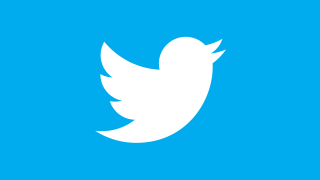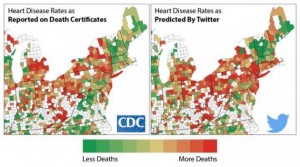
Earlier this week, national news headlines shouted from the rooftops that Twitter may know when or if you will have a heart attack. This was based on a study that came out recently in which the authors claimed they found a correlation between negative tweets and heart disease. The study was published in the journal Psychological Science, but unfortunately, no, Twitter cannot predict if you will have a heart attack.
Quickly after the study results were released, journalists jumped on the story with sensational headlines such as Are You at Risk for a Heart Attack? The Answer May Lie in Your Twitter Stream and Twitter knows when you’re going to have a heart attack. There is one major problem with this headline, though: Twitter totally does not know when, or if, you, personally, will have a heart attack.
It is always tempting to write a catchy headline. In fact, it is a journalist’s job to do so. The issue arises when the headline is not simply catchy, but completely misleading. Such is the case with stating that Twitter “knows” when an individual may suffer a cardiac event. What the study actually showed was a correlation between communities in which people sent out a lot of negative tweets, and rates of heart disease. And of course, as we all know, correlation does not equal causation.
So while researchers did see a link between areas from which negative tweets were sent and heart attacks, it did not look at any data for any individual person. Therefore, the study tells us nothing, zero, nada, about whether someone will experience heart disease or “when you’re going to have a heart attack,” despite what the headline says.
The link the scientists did find is tenuous, too. The correlation could be due to thousands, maybe even millions, of other factors. What if people in that area eat a lot of fast food, and that makes them irritable due to lack of good nutrition, so they sent out more negative tweets? Then it is the fast food that could be contributing to their heart attacks, and the tweets are ancillary, and therefore unimportant.
Another key factor to consider is that so far, only one study is showing these results. Generally, before a journalist announces a big breakthrough conclusion, he or she vets the headline by fact checking and making sure there are multiple studies and meta analyses backing up the claim.
For example, there have been studies in the past that showed that smoking was not linked to lung cancer. However, those studies were later ruled out as more research became available. Still, there may have been some newspapers that blared out the headline Smoking Is Safe For the Lungs, Study Finds. Of course, that would have had to have been retracted at a later time, and that is always an embarrassment.
Here is what the study abstract actually concluded:
A cross-sectional regression model based only on Twitter language predicted AHD mortality significantly better than did a model that combined 10 common demographic, socioeconomic, and health risk factors, including smoking, diabetes, hypertension, and obesity. Capturing community psychological characteristics through social media is feasible, and these characteristics are strong markers of cardiovascular mortality at the community level.
Health care journalist Gary Schwitzer posted a scathing review of the aforementioned news stories and he says that journalists should be accountable for properly vetting study results before publication. He also points out that the study authors told one story when writing their paper and another when being interviewed subsequent to the results being published. It was from some of those interviews that reporters gleaned the sensational headlines.
However, neither the interviews nor the study state that Twitter, or any social media outlet, can predict when or if an individual person will suffer from any particular health problem, heart attack or otherwise. One medical expert, Dr. Steve Miles, pointed out that “At best the level of hostile tweets is associated with a 6% risk increased risk of heart attack.” That may or may not be statistically significant because it would probably take many additional studies to confirm these initial results. Even if all subsequent studies came up with the same data, six percent is a very small number and does not mean anything when applied to an individual because so many other factors are at play when it comes to health, especially genetics, for example. Dr. Miles also noted, “This study does not try to show any correlations between what a person tweets and that person’s risk of a heart attack.”
The study was said to have been controlled for income level, educational level, age, weight and several health factors such as smoking. In all, there were ten items used for control. However, as some in the medical community have pointed out, the demographic that uses Twitter is generally not as at risk for heart disease due to being so young. That alone casts some doubt on the results.
One of the most important points the medical experts have illuminated in this discussion is the old “which came first, the chicken or the egg?” question. What if the tweets are linked to high levels of heart disease because people who suffer from heart disease are depressed and even angry? Certainly they would then send out more tweets that were negative. Thus, the results would not indicate anything about negativity on social media causing heart disease but rather the more common-sense answer that people who are ill tend to be more negative than healthy people; and it does not necessarily take a study to figure that out.

Some doctors are coming right out and stating that the study results are basically irrelevant, and that they definitely do not mean that Twitter can predict if you will have a heart attack. In an email to Schwitzer, John Hopkins professor Dr. Zack Burger wrote: “The claim that the Tweet-based model predicts mortality from heart disease better than traditional risk factors is weakened when one looks at the actual results…The reports in the lay press overestimate, flatten out and misrepresent an intriguing hypothesis-generating study into something that these stories imply is relevant to health today. Not so.”
Reporters who work in the trenches of journalism wield great power over the public, and as the old saying goes, “with great power comes great responsibility.” It is always tempting to write the most intriguing and thought-provoking headline possible; in fact, it is essential to do so. It is part of the job. But the other, and much more important part of the job is accurately representing the facts without being misleading, even if that misinformation is unintentional.
It is crucial that journalists think carefully about what they are writing, especially when it comes to titles. No, Twitter cannot predict if you will have a heart attack, or at least it cannot based on the one study that has been published. So for now, go ahead and vent on Twitter without fear, and most importantly: take sensational headlines with, as cardiologist Dr. Sahil Parikh puts it, “with a very large grain of salt.”
